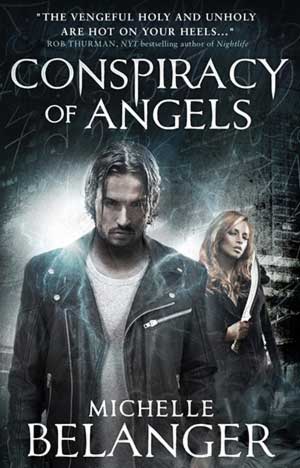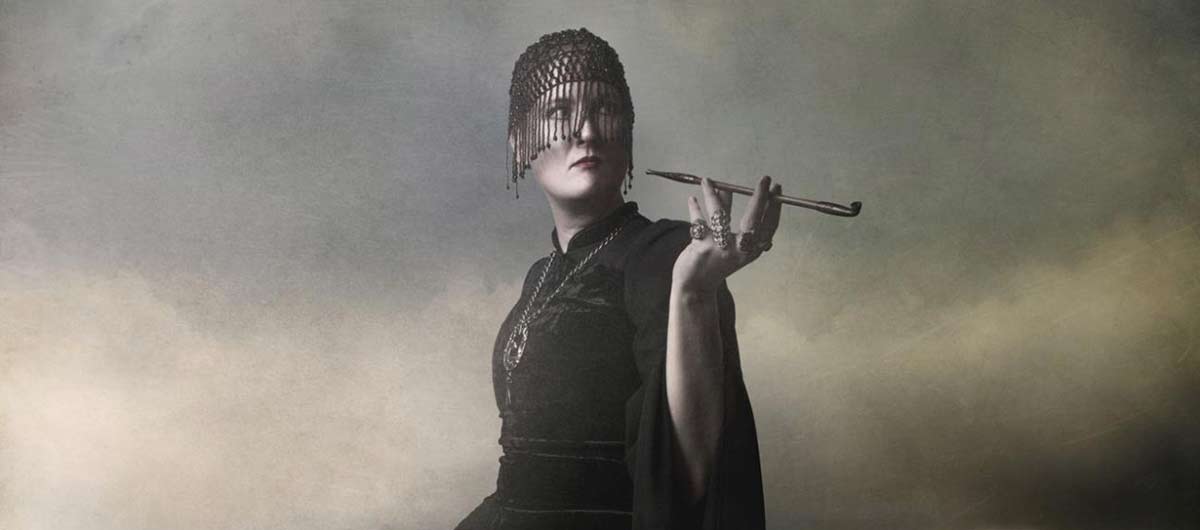Michelle Belanger is a psychic vampire. Let’s just get that out of the way.
Of course, assuming you’re not a vampirism enthusiast, you might also recognize her from A&E’s Paranormal State, where she put her skills to use as a paranormal investigator. She’s as close to a vampire expert as you can get, having acted as a spokesperson and educator for an often sensationalized modern vampirism subculture. In fact, Michelle has put in work advocating for occult communities in numerous places, from morning shows to universities. She has a highly informative YouTube channel. She does energy readings. Basically, she knows this stuff inside and out.
Related Posts
An academic, Michelle has penned more than a few nonfiction books including The Dictionary of Demons and The Psychic Vampire Codex. And now, having transitioned into fiction with the upcoming release of Conspiracy of Angels…
Yes, I said psychic vampire. No, it’s totally different than the ones from Twilight. Yes, it makes a difference. No, no blood sucking. Yes, those exist too, but it’s not the same…
You know what? I’ll just let Michelle explain. She’s super good at it and has done it a million times before.
You have an interesting story as to how you came to identify as a psychic vampire. For the uninitiated, can you explain the difference between a psychic vampire and the vampires you might traditionally see represented in media?
A psychic vampire is a person who needs to regularly and actively take in human, vital energy in order to maintain their perceived health and well-being. I say “perceived” because we have no hard science to support this fact, even though for those of us who identify as psychic vampires it is an inarguable truth of our existence. The psychic part is pretty cut and dried – – in order to harness this vital energy, we are also sensitive to it, and it is energy like that which psychics are picking up on when they read emotional imprints left in places where great traumas have occurred, such as your classic haunted house.
Obviously, that’s all quite different from the kind of vampire people have grown accustomed to seeing in literature. We use the word “vampire” simply because we have no better word in the English language for someone who feeds upon life. Individuals who identify a psychic vampires, like myself, understand that we are not like movie vampires, nor are we like those vampires who stalked across Eastern Europe in folklore. In many respects, we use the word vampire in much the same way that a modern practitioner of magic uses the word “witch.” It is a term repurposed and even reclaimed from folklore and myth.
 You are generally known for your nonfiction like the Psychic Vampire Codex. Why make the jump to fiction with your upcoming book Conspiracy of Angels? Do you think followers of your previous work will seamlessly make the jump with you?
You are generally known for your nonfiction like the Psychic Vampire Codex. Why make the jump to fiction with your upcoming book Conspiracy of Angels? Do you think followers of your previous work will seamlessly make the jump with you?
I’m hoping that they do. That said, I know fiction isn’t everyone’s thing, and that’s fine. As for myself, I have always been a voracious reader of both fiction and nonfiction, so it should come as no surprise that I also enjoy writing both. There is something deeply satisfying in crafting worlds and peopling them with stories. And, of course, my background as a nonfiction writer does come through, because I cannot resist weaving factual research into the fantastical worlds of my craft.
In many ways, the Shadowside Series, from Conspiracy of Angels on down, is a logical outgrowth of my research in all of the topics for which I have become known. It is a place for me to play with those topics and indulge in a game of What if… For that reason, if for no other, I think even my die-hard nonfiction fans will find the Shadowside a fascinating place to explore.
Did you come of age as a psychic vampire before the internet became so ubiquitous? How do you think the internet has affected the growth, methodologies, and culture of current vampire and supernatural communities? Does it encourage or erode the secrecy that might be inherent in these communities?
Related Posts
I came to terms with the identity long before the Internet became such a mainstay of our culture. I was hardly the first, but I was certainly among the leading edge of individuals who ultimately formed the modern vampire community as it stands today.
As I have watched that community change and grow over the years, it has become obvious to me that the Internet is both our greatest blessing and our greatest curse. On one hand, it significantly reduced the isolation in which the vast majority of self-identified vampires existed prior to the rise of Internet culture. As anyone familiar with fringe communities knows (vampire or otherwise), that isolation can be a literal killer — especially for individuals in the very early stages of discovering themselves. It sacrifices a certain amount of secrecy, not to mention privacy, but the notion of a completely transparent society is an illusion. There remain many individuals and groups connected with the vampire community that simply keep themselves separate from Internet culture in order to safeguard the privacy which they love.
Perhaps our biggest problem is the fact that the democratization of information on the Internet is not always a boon. At this point, the Internet is a little like the Wild West, with very little oversight, and very little protection for newcomers who have yet to develop the ability to adequately recognize the predators and the trolls. With the vampire community specifically and paranormal communities in general, this means that there is easily as much bad information as good. For every person who runs a site with the sincere intention to educate, there are at least three who seek simply to promote themselves or to maliciously mislead.
There was an old saying in the Roman empire with regards to the marketplace: Caveat Emptor. Let the buyer beware. For the digital age, I would amend this to, “Let the viewer beware.” It is best to double-check everything that we encounter on the Internet — on vampires and pretty much everything else.
As a musician, do you see a link between certain music genres and the paranormal? For example, is there any truth to the idea that paranormal communities, like goths, are prone to heavier, darker rock genres?
I absolutely believe that certain communities and movements are more prone to an interest in the occult and paranormal. That this is one of the fundamental interests at the core of the Gothic subculture is hard to dispute, as modern goths hearken back to the Romantics of old. Themes like vampires and magic, death and immortality, forbidden powers, dark, foreboding locales are woven throughout not merely the literature but all of the artistic expression arise from the movement — from art to music to fashion. This is true of the old Romantics like Byron and Shelley, and it is true of modern Gothic culture.
I also see absolutely nothing wrong with it, nor anything dangerous. These are profound and compelling themes that provide fertile material for inspiration.
As an academic, do you ever feel like there is a tension between your belief in the paranormal and your more secular studies?
I think the tension between fact and belief is unavoidable, and I would be a bad academic if I didn’t recognize the distinction. That said, it is human nature to develop beliefs that exist beyond the facts with which we are presented, and many scholars are faced with the task of navigating between their conviction and their proof.
Related Posts
I do my best as an academic to be clear on the nature of the information I convey – – if it is a belief, or an opinion, I make an effort to state it as such. And when I am dealing with facts, I do my absolute best to cite my sources and to dig as far back into primary resources as possible.
I can think of no better example for the way in which I navigate that delicate line than my Dictionary of Demons which acknowledges that there are theological beliefs about demons, does not attempt to confirm or dispute them, but simply presents all of the factual information I could dig up about those beliefs as they have developed in Western culture.
What do you think would surprise the larger public about your life as a psychic vampire or about psychic vampires in general?
Vampire soccer moms. No, really. They exist. A lot of us are incredibly normal in every aspect of our lives, with the one exception that we identify as vampires.
What message would you give to young girls and boys contemplating their own vampirism, energy reading, or connections to the paranormal?
Research, and read widely. Do not limit yourself to one person’s teachings, nor even to only one point of view. When you encounter any book or individual that is presented as an authority, make certain that you check your source’s sources. When someone present a quote, track it down. We live in the age of the Internet where such things are easily misrepresented, but if you are smart about it, they are also easy to either debunk or confirm.
In addition to learning as much as possible about the things with which you resonate, make certain that you also take time to learn about yourself. That is information that cannot exist in any book or on any Internet site. It is a work in progress, and do not be afraid to amend your beliefs as new information presents itself from either within or without. At all times, and throughout the work which is your life, seek your own truth.
